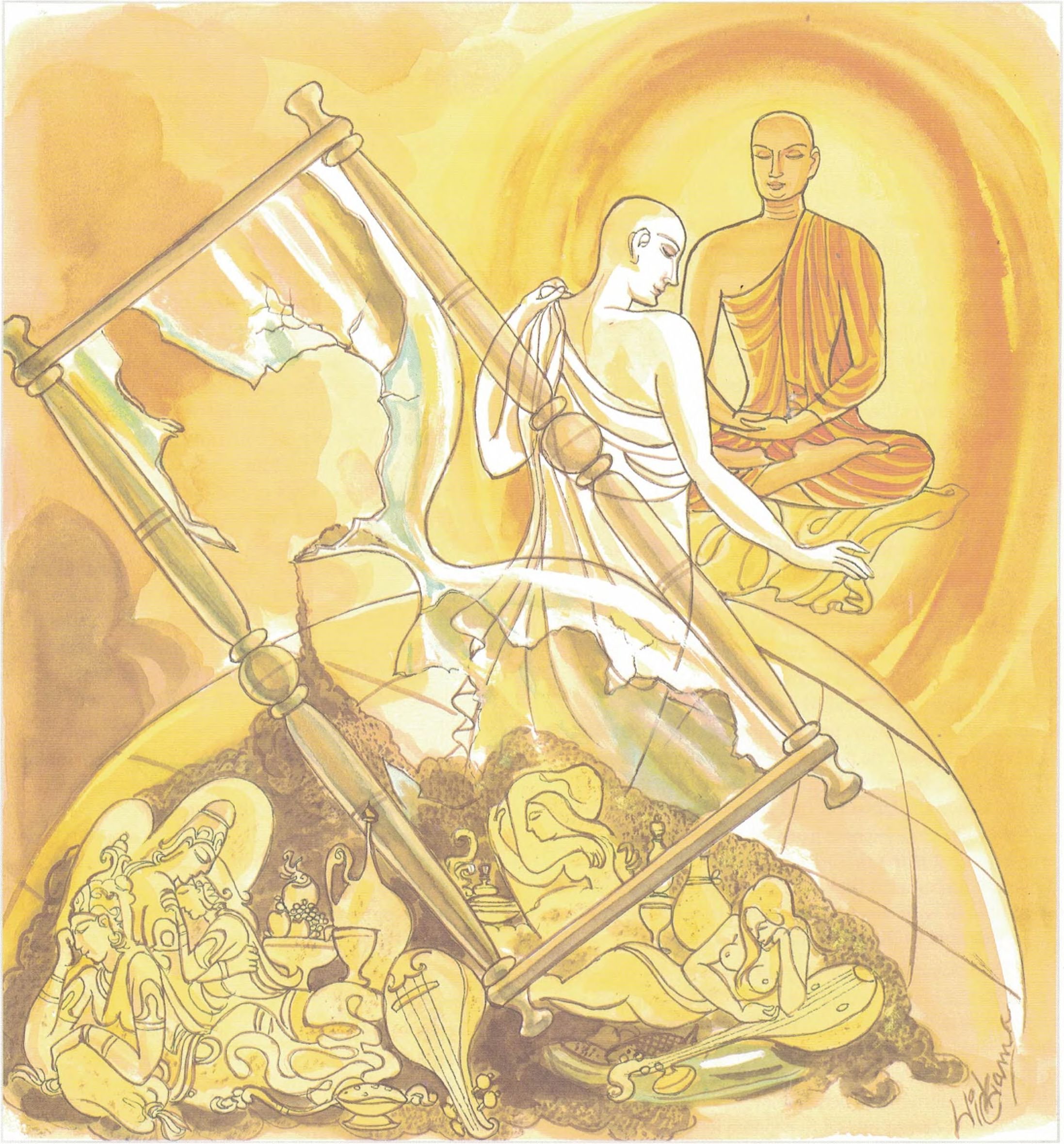Dhammapada (Illustrated)
by Ven. Weagoda Sarada Maha Thero | 1993 | 341,201 words | ISBN-10: 9810049382 | ISBN-13: 9789810049386
This page describes The Story of the Monk who was once a Mime which is verse 417 of the English translation of the Dhammapada which forms a part of the Sutta Pitaka of the Buddhist canon of literature. Presenting the fundamental basics of the Buddhist way of life, the Dhammapada is a collection of 423 stanzas. This verse 417 is part of the Brāhmaṇa Vagga (The Brāhmaṇa) and the moral of the story is “Rejects human ties, surpasses the heavenly too. Totally unbound, him I call a brahmin true”.
Verse 417 - The Story of the Monk who was once a Mime
Pali text, illustration and English translation of Dhammapada verse 417:
hitvā mānusakaṃ yogaṃ dibbaṃ yogaṃ upaccagā |
sabbayogavisaṃyuttaṃ tamahaṃ brūmi brāhmaṇaṃ || 417 ||
417. Abandoned all the human bonds and gone beyond the bonds of gods, unbound one is from every bond, that one I call a Brahmin True.
 Rejects human ties, surpasses the heavenly too. Totally unbound, him I call a brahmin true. |
The Story of the Monk who was once a Mime
It is said that a certain mime, giving performances from place to place, heard the Buddha preach the Dhamma, whereupon he retired from the world, became a monk, and attained arahatship. One day, as he was entering the village for alms, in company with the congregation of monks presided over by the Buddha, the monks saw a certain mime going through his performance. Thereupon they asked the monk who was once a mime, “Brother, yonder mime is going through the same kind of performance you used to go through; have you no longing for this sort of life?” “No, brethren,” replied the monk. The monks said to the Buddha, “Venerable, this monk utters what is not true, is guilty of falsehood.” When the Buddha heard them say this, He replied, “Monks, my son has passed beyond all bonds.”
Explanatory Translation (Verse 417)
mānusakaṃ yogaṃ hitvā dibbaṃ yogaṃ upaccagā
sabbha yoga visaṃ yuttaṃ taṃ ahaṃ brāhmaṇaṃ brūmi
mānusakaṃ yogaṃ [yoga]: human bonds; hitvā: having given up; dibbaṃ yogaṃ [yoga]: divine; heavenly-bonds; upaccagā: has crossed over; sabba yoga visaṃ yuttaṃ [yutta]: disengaged from all bonds; taṃ: him; ahaṃ: I; brāhmaṇaṃ brūmi: declare a brāhmaṇa
He has given up the bonds that bind him to humanity. He has gone beyond the bonds of attachment to life in heaven as well. This way, he is disengaged from all bonds. I declare such a person to be a brāhmaṇa.
Commentary and exegetical material (Verse 417)
The present verse arises out of the story of a mime. This person achieved the highest fruits of spiritual pursuit, through unfailing effort. This spiritual effort is referred to on padhāna: effort. The four right efforts (saṃma-ppadhāna), forming the sixth stage of the eight-fold path (saṃmā-vāyāma) are: (1) the effort to Avoid (saṃvara-padhāna), (2) to overcome (pahāna), (3) to develop (bhāvanā), (4) to maintain (anurakkhaṇa): (i) the effort to avoid unwholesome (akusala) states, such as evil thoughts etc., (ii) to overcome unwholesome states, (iii) to develop wholesome (kusala) states, such as the seven elements of enlightenment (bojjhaṅga), (iv) to maintain the wholesome states.
The monk rouses his will to avoid the arising of evil, unwholesome things not yet arisen… to overcome them… to develop wholesome things not yet arisen… to maintain them, and not to let them disappear, but to bring them to growth, to maturity and to the full perfection of development. And he makes effort, stirs up his energy, exerts his mind and strives.
(1) What now, O’ monks, is the effort is avoid? Perceiving a form, or asound, or an odour, or a taste, or a bodily or mental impression, the monk neither adheres to the whole, nor to its parts. And he strives to ward off that through which evil and unwholesome things might arise, such as greed and sorrow, if he remained with unguarded senses; and he watches over his senses, restrains his senses. This is called the effort to avoid.
(2) What now is the effort to overcome? The monk does not retain any thought of sensual lust, or any other evil, unwholesome stages that may have arisen; he abandons them, dispels them, destroys them, causes them to disappear. This is called the effort to overcome.
(3) What now is the effort to develop? The monk develops the factorsto enlightenment, bent on solitude, on detachment, on extinction, and ending in deliverance, namely, mindfulness (sati) investigation of the Dhamma (Dhammavicaya), concentration (samādhi) effort (viriya), joy (pīti), repose (passaddhi), equanimity (upekkhā). This is called the effort to develop.
(4) What now is the effort to maintain? The monk keeps firmly in his mind a favourable object of concentration, such as the mental image of a skeleton, a corpse infested by worms, a corpse blue-black in colour, a festering corpse, a riddled corpse, a corpse swollen up. This is called the effort to maintain.”
